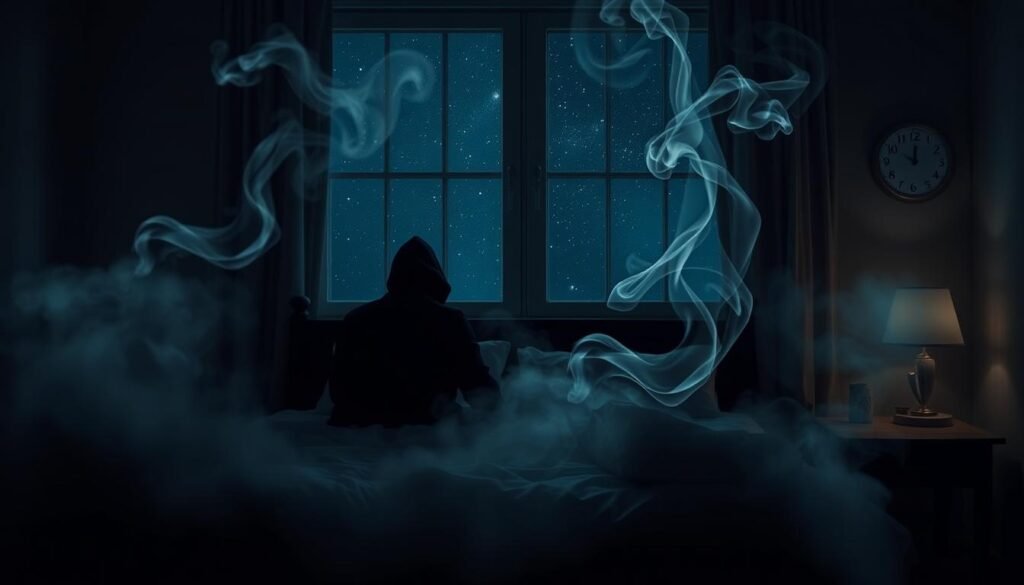Smokers face a higher risk of sleep problems than non-smokers, with nearly 50% more likely to struggle. This fact highlights a clear link between nicotine intake and sleep quality. Nicotine, found in tobacco and e-cigarettes, does more than just mess with your brain. It also shakes up your body’s sleep cycle. This leads to issues like insomnia and sleep apnea for those addicted to nicotine. It’s key to understand this impact if you’re looking to better your sleep and lower nicotine use.
This piece will dive into how nicotine and sleep are connected, explaining what’s happening inside your body. Things such as tolerance, dependence on nicotine, and withdrawal effects are crucial. They majorly affect sleep quality and your natural sleep-wake cycle. By exploring this topic, we aim to help you make positive for your health.
Key Takeaways
- Smokers face a significantly increased risk of sleep issues.
- Nicotine affects sleep quality and stages, leading to insomnia.
- Nicotine addiction often leads to a reliance on frequent doses throughout the day.
- Withdrawal symptoms from nicotine can disrupt sleep patterns.
- Exercise can aid in reducing cravings and improving sleep quality.
- Second-hand smoke exposure negatively affects sleep health.
The Role of Nicotine in the Body
Nicotine is a strong chemical found in tobacco. It affects the central nervous system (CNS) and the heart system fast. It goes into the blood through the lungs, mouth, and skin. This quick action causes nicotine physiological effects. These effects include making more neurotransmitters like dopamine, serotonin, and norepinephrine. This leads to feeling more alert, in a better mood, and enjoying pleasurable sensations.
With ongoing nicotine use, the brain’s receptors change a lot. This happens because of nicotine metabolism and leads to addiction. To feel the same effects, more nicotine is needed. The way nicotine hooks people shows how complex its impact is. This drives them to keep using nicotine to keep their brain working right. Studies show that nicotine changes the number and shape of cholinergic receptors. This proves its big role in tobacco addiction.
Nicotine use can cause several symptoms when you don’t have it, especially during sleep. People might have trouble sleeping and get insomnia when they stop using nicotine. Using nicotine close to bedtime can really make sleep worse. It leads to long-lasting problems like broken sleep patterns. Research looks at how nicotine might help with thinking but also harms sleep and health overall.
Understanding the Natural Sleep Cycle
The natural sleep cycle includes sleep stages like REM (Rapid Eye Movement) and non-REM sleep. They are key for restorative sleep. Each part has important roles for our mind and body to refresh.
This cycle is guided by our circadian rhythm. It reacts to things like light exposure and darkness.
Studies show smokers may take 5–25 minutes longer to fall asleep than nonsmokers. Many smokers have trouble sleeping well, with 80% saying they sleep less. Nicotine affects sleep quality badly, especially if used before bed.
Older adults, over 65, face extra sleep challenges due to slower body processes. This includes slower blood flow to the liver.
Nicotine can mess with our circadian rhythm, making us feel more tired during the day. This shows the link between smoking and bad sleep. Good sleep hygiene can help improve sleep quality. Keeping your bedroom cool, dark, and quiet helps with restorative sleep.
To sum up, knowing how the sleep cycle works shows how substances like nicotine can disrupt healthy sleep. For more on how substances affect sleep, check out this study on e-cigarette and cigarette use.
Why Nicotine Disrupts the Body’s Natural Sleep Cycle
Nicotine messes with our natural sleep cycle in several ways, harming sleep quality. It makes the heart beat faster and raises blood pressure. This makes it hard to get peaceful sleep. Smokers often find it harder to fall asleep than non-smokers. They also wake up more during the night. Such sleep problems can lead to insomnia.
Mechanisms of Disruption
Vaping nicotine can cause swelling in the nose and upper airway, disturbing sleep. As a stimulant, nicotine makes it harder to sleep well. It keeps the mind too alert during the night. Nicotine reduces good sleep stages like REM. It can cause breathing to stop for short times, ruining sleep.
Some people think nicotine might help with obstructive sleep apnea at first. But withdrawal symptoms can worsen breathing problems later.
Effects on Sleep Stages
Nicotine changes sleep patterns badly. People using it often get less deep, restful sleep. They stay longer in lighter sleep stages. This leads to broken sleep, making insomnia more common. Young folks who vape report feeling tired in the day and not sleeping well.
It’s important to know how nicotine changes sleep stages. This knowledge can help improve sleep health for everyone.
Stimulant Effects of Nicotine
Nicotine is a strong stimulant that affects both the mind and body. It impacts sleep and how we feel, especially with products that have nicotine. People who use e-cigarettes, cigarettes, vape pens, or other tobacco things really feel this.
How Stimulants Interfere with Sleep
Stimulants like nicotine hit the central nervous system hard. They make you more alert and awake. This can make it tougher to fall asleep.
Studies show nicotine messes with your sleep. It can make you wake up more at night. It also cuts down on deep sleep, which is super important for staying healthy.
Comparing Nicotine with Other Stimulants
Looking at nicotine versus caffeine, there are big differences. Caffeine can keep you up if you drink it late. Its effects last through the day.
Nicotine, on the other hand, works right away and strongly affects sleep. Both can mess up your natural sleep patterns. Yet, nicotine can make your sleep quality even worse, especially if you’re experiencing more insomnia.

Impact of Nicotine on Sleep Quality
Nicotine greatly affects how well we sleep, causing many to toss and turn. Smokers often find it hard to stay asleep and don’t get enough deep sleep. About 80% of smokers suffer from not sleeping well. This leads to feeling tired all day and shows how bad nicotine can harm our sleep.
Nicotine doesn’t just make it hard to fall asleep. It might take smokers 5 to 25 minutes longer to drift off than people who don’t smoke. This can lead to not getting enough rest. Using nicotine close to bedtime worsens sleep quality. It keeps us from getting deep, healing sleep stages like N3, which we need to feel good.
Research shows smokers tend to have more light sleep and less of the deep sleep needed for feeling rested. This change in sleep patterns from nicotine harms our thinking and daily life. It lowers our quality of life. If you’re struggling with nicotine, understanding these effects on sleep is key. Making changes can truly better your health.
| Sleep Stage | Smokers | Nonsmokers |
|---|---|---|
| N1 Sleep | Higher Percentage | Lower Percentage |
| N2 Sleep | Higher Percentage | Lower Percentage |
| N3 Sleep | Lower Percentage | Higher Percentage |
| Time to Fall Asleep | 5-25 Minutes Longer | Standard Time |
| Daytime Sleepiness | Increased Reports | Less Common |
Nicotine Addiction and Sleep Issues
Nicotine addiction makes sleep health much harder. People stuck in this addiction face a strong psychological need, which makes sleep loss worse. The body’s need for nicotine causes a cycle. Cravings increase smoking. This harms the ability to sleep well, making the addiction circle tighter.
Psychological Dependence and Sleep Deprivation
Being psychologically dependent on nicotine is a big barrier to good sleep. Nicotine changes how the brain handles wakefulness, making sleep hard to come by. Withdrawal stress makes sleep loss worse, increasing the urge to smoke. This creates a bad loop where worry about sleep leads to more nicotine use, growing the addiction.
The Cycle of Addiction and Sleep Disorders
Many people are trapped in an addiction cycle. Nicotine use causes bad sleep. Poor sleep then leads to more smoking. This cycle keeps the addiction going and leads to long-term sleep problems. Studies show that smoking and not enough sleep can cause serious health issues like obesity and heart problems. Understanding the link between nicotine addiction and sleep troubles is key for quitting and recovery.

Withdrawal Symptoms Affecting Sleep
People trying to quit smoking often face withdrawal symptoms that hurt their sleep quality. It’s vital to know these symptoms, as they affect recovery.
Common Withdrawal Symptoms
Withdrawal symptoms differ for everyone, but they often include:
- Irritability
- Anxiety
- Increased cravings for nicotine
- Restlessness
- Difficulty concentrating
Sleep issues are a major problem when quitting nicotine. This happens as the body gets used to not having nicotine.
Impact on Sleep Patterns During Withdrawal
Many people have trouble sleeping when they stop smoking. They find it hard to sleep, wake up a lot, feel tired during the day, and see changes in how long they sleep.
- Difficulty falling asleep
- Frequent awakenings during the night
- Daytime fatigue
- Changes in sleep duration
A study shows less than 25% of quitters face sleep problems. These usually last about four weeks. Starting good sleep habits early can ease these issues and make sleep better.
Sleep Disorders Associated with Nicotine Use
Nicotine use can lead to various sleep issues, impacting sleep quality significantly. Many smokers suffer from insomnia, sleep apnea, and uneven sleep patterns. Studies show that up to 83.6 million adults in the U.S. have some sleep or wakefulness disorder. Knowing how smoking relates to sleep problems can help underline why it’s crucial to tackle these issues for better health.
An Overview of Common Disorders
Smokers often experience a range of sleep difficulties. These can result in several sleep disorders. Insomnia is much more common in smokers than non-smokers. Nicotine dependence can aggravate this situation. Trying to smoke to improve sleep can actually make sleep problems worse. Smoking is also linked to:
- Sleep apnea
- Restless legs syndrome
- Chronic insomnia
Specific Conditions Linked to Smoking
Smoking is directly connected to respiratory issues, which adversely affect sleep. Lung problems like chronic bronchitis and emphysema can deepen sleep troubles. Smokers often report breathing difficulties at night. Research points out that these problems are much more common in heavy smokers. Also, nicotine disrupts the natural sleep-wake cycle. This makes it hard to get restful sleep.
The table below shows how smoking relates to various sleep disorders:
| Sleep Disorder | Prevalence in Smokers | Impact on Sleep Quality |
|---|---|---|
| Insomnia | Higher prevalence | Difficulty falling asleep and staying asleep |
| Sleep Apnea | Increased risk | Repeated pauses in breathing during sleep |
| Restless Legs Syndrome | Common | Disruption of sleep due to uncomfortable sensations |

Seeing the link between smoking and sleep issues is critical. It highlights the need to deal with nicotine dependence. This not only shows the impact of smoking on sleep disorders. It also underlines the value of good sleep for a healthy life.
Strategies for Quitting and Promoting Better Sleep
Quitting nicotine greatly improves sleep. Stopping smoking not only eases withdrawal but also helps develop good sleep habits. These shifts greatly benefit well-being and restore natural sleep.
Effective Smoking Cessation Methods
One good way to quit is through nicotine replacement therapy (NRT). NRT gives a controlled nicotine dose to ease withdrawal, making quitting easier. Combining NRT with behavior strategies like therapy or support groups helps too. Together, these steps help improve mental and physical health.
Healthy Sleep Habits to Implement
Adopting good sleep habits is key when stopping smoking. A regular sleep schedule helps your body’s clock. Cutting back on caffeine, especially later in the day, is also important. It’s best to avoid caffeine eight hours before sleep.
Being active during the day can improve sleep at night. For more tips on better sleep, check out healthy sleep habits. Small changes can make a big difference in how well you sleep.
Conclusion
Nicotine’s effect on sleep is important but complex. Studies show that using nicotine in the evening can lower sleep quality. This can lead to problems with sleep.
People showed a 1.74% drop in how well they slept after using nicotine at night. They also took over six minutes longer to fall back asleep after waking up. Knowing how nicotine affects sleep is key for anyone trying to overcome addiction and sleep problems.
Making healthy changes can help improve sleep. Quitting nicotine can lead to better sleep and overall health. This is crucial for reducing the bad effects of nicotine.
It’s not just about stopping nicotine use. It’s about choosing better sleep habits too. By dealing with sleep disruptions from nicotine, people can greatly improve their life.